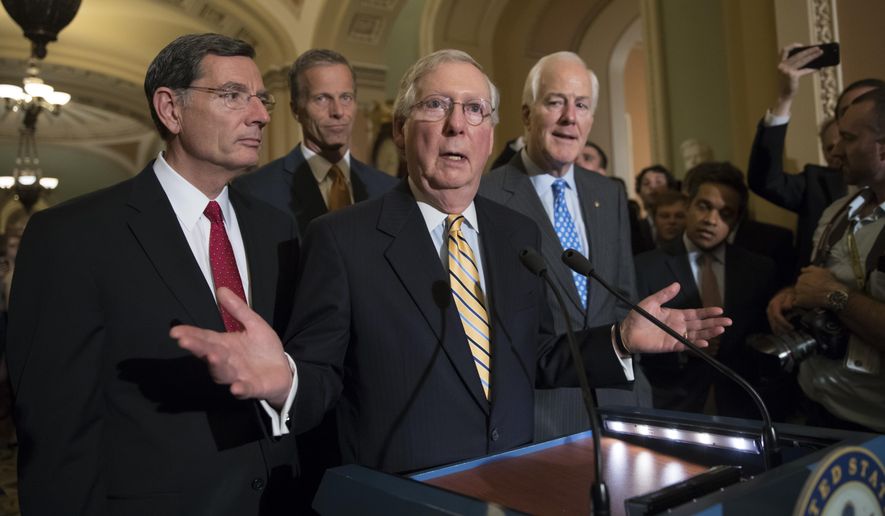The push for a “clean” repeal of Obamacare died Wednesday after Senate Republicans were unable to rally the votes, forcing leaders to turn to watered-down proposals that would repeal only some of the onerous parts of the troubled health care law.
Seven Republicans, including six who supported it two years ago, voted against repeal. Fellow Republicans said they broke their promise to voters.
The party’s defectors said they wouldn’t commit to repeal without knowing what would replace it. The two-year grace period that party leaders wrote into the repeal proposal wasn’t enough of an assurance, they said, and millions of Americans could lose coverage if an alternative plan wasn’t in place.
With their backs against the wall, Republican leaders are floating a last-ditch “skinny” repeal. Details are still being finalized, but Republicans described it as ditching Obamacare’s unpopular mandate requiring individuals to hold insurance, its rule requiring large employers to provide coverage and its tax on medical device sales.
The idea is to prolong the debate so Senate negotiators can sit down with House lawmakers, who passed a repeal-and-replacement plan in May, and try to work out a broader deal in a conference committee.
“What you’re really voting on is to try and keep the discussions alive with the House and Senate. It’s not the policy itself,” said Sen. Bob Corker, Tennessee Republican.
It was a far cry from Republicans’ seven-year pledge to voters to rip out Obamacare, “root and branch,” once they were put in charge of Congress and the White House.
The seven Republicans who joined Democrats in opposing repeal were Sens. Susan M. Collins of Maine, Lisa Murkowski of Alaska, Shelley Moore Capito of West Virginia, Dean Heller of Nevada, John McCain of Arizona, Rob Portman of Ohio, and Lamar Alexander of Tennessee, chairman of the Senate Health, Education, Labor and Pensions Committee.
All but Ms. Collins voted for the 2015 repeal, which President Obama vetoed.
“Today’s vote is a major disappointment to people who were promised full repeal,” said Sen. Ben Sasse, Nebraska Republican. “We still have a long, long way to go both in health policy and in honesty.”
Mr. Alexander explained his switch by saying the Obamacare markets are in worse shape than they were in 2015, and his constituents need relief now instead of banking on Congress to forge a replacement down the road.
“Pilots like to know where they’re going to land when they take off,” he said, “and we should too.”
The vote was the latest setback for Senate Majority Leader Mitch McConnell, Kentucky Republican, who has struggled to rally his 52-seat majority behind a repeal plan.
“This certainly won’t be easy. Hardly anything in this process has been,” he said. “But we know that moving beyond the failures of Obamacare is the right thing to do.”
Minority Leader Charles E. Schumer, New York Democrat, pleaded with the Republican holdouts to also reject the skinny repeal plan.
“It’s a ruse to get to full repeal,” he said.
Later Tuesday, Mr. Schumer said Democrats wouldn’t even try to amend the underlying plan because it’s “already dead.” He said they would wait for the skinny repeal, if it’s really coming.
“Once the majority leader shows his hand, reveals what his bill will actually be, Democrats will use our opportunity to try to amend the bill. But we have to see it first,” he said.
The skinny repeal plan would avoid thorny Medicaid cuts that scared off Republican moderates, though conservatives would likely push to revive them during conference negotiations.
Sen. Rand Paul, a Kentucky Republican who pushed for a clean repeal, said senators should pass a more limited repeal and be done with it rather than reverting to discarded replacement ideas.
“I think if we go to conference, it’s just going to get built back up to the monstrosity that we just voted down,” he said.
Moderate Republicans such as Ms. Capito and Ms. Collins told reporters that they didn’t know if they could support a slimmed-down plan and that they hadn’t seen the text.
The idea is unnerving insurers.
Obamacare was premised on the idea of forcing young and healthy customers into the market and using their premiums to help pay for care for older and sicker customers who could no longer be denied coverage.
Without the mandate, insurers fear, younger and healthier customers will wait to sign up until they need coverage, turning into yet another financial liability.
The Blue Cross Blue Shield Association demanded that any bill include immediate funding for cost-sharing subsidies to reimburse insurers that lose money on low-income customers under Obamacare.
• Tom Howell Jr. can be reached at thowell@washingtontimes.com.




Please read our comment policy before commenting.